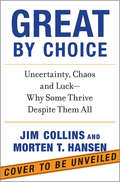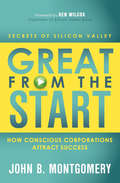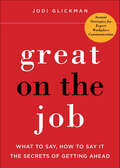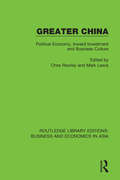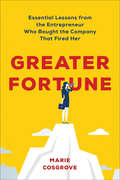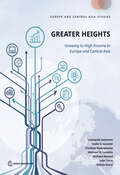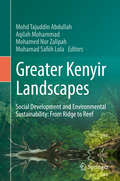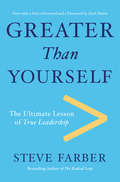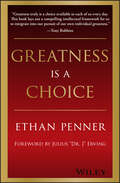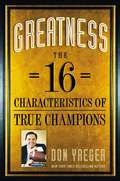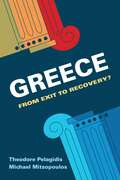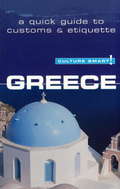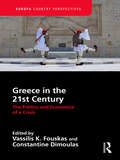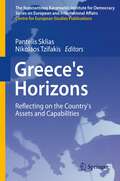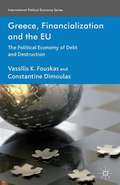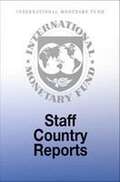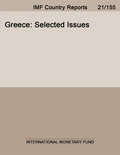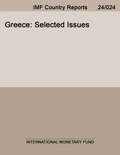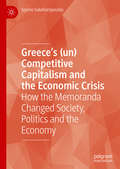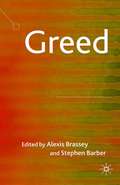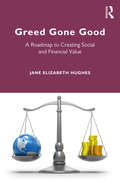- Table View
- List View
Great by Choice
by Jim Collins Morten T. HansenThe new questionTen years after the worldwide bestseller Good to Great, Jim Collins returns with another groundbreaking work, this time to ask: Why do some companies thrive in uncertainty, even chaos, and others do not? Based on nine years of research, buttressed by rigorous analysis and infused with engaging stories, Collins and his colleague, Morten Hansen, enumerate the principles for building a truly great enterprise in unpredictable, tumultuous, and fast-moving times.The new studyGreat by Choice distinguishes itself from Collins's prior work by its focus not just on performance, but also on the type of unstable environments faced by leaders today.With a team of more than twenty researchers, Collins and Hansen studied companies that rose to greatness--beating their industry indexes by a minimum of ten times over fifteen years--in environments characterized by big forces and rapid shifts that leaders could not predict or control. The research team then contrasted these "10X companies" to a carefully selected set of comparison companies that failed to achieve greatness in similarly extreme environments.The new findingsThe study results were full of provocative surprises. Such as:The best leaders were not more risk taking, more visionary, and more creative than the comparisons; they were more disciplined, more empirical, and more paranoid.Innovation by itself turns out not to be the trump card in a chaotic and uncertain world; more important is the ability to scale innovation, to blend creativity with discipline.Following the belief that leading in a "fast world" always requires "fast decisions" and "fast action" is a good way to get killed.The great companies changed less in reaction to a radically changing world than the comparison companies.The authors challenge conventional wisdom with thought-provoking, sticky, and supremely practical concepts. They include: 10Xers; the 20 Mile March; Fire Bullets, Then Cannonballs; Leading above the Death Line; Zoom Out, Then Zoom In; and the SMaC Recipe.Finally, in the last chapter, Collins and Hansen present their most provocative and original analysis: defining, quantifying, and studying the role of luck. The great companies and the leaders who built them were not luckier than the comparisons, but they did get a higher Return on Luck. This book is classic Collins: contrarian, data-driven, and uplifting. He and Hansen show convincingly that, even in a chaotic and uncertain world, greatness happens by choice, not chance.
Great from the Start: How Conscious Corporations Attract Success
by John B. MontgomeryThe founder of the technology incubator Startworks provides &“a useful all-in-one blueprint to cover all aspects of putting together a successful company&” (Young Upstarts). Are you wondering how to turn your great new business idea into a successful company? Here&’s the roadmap. In Great from the Start, John Montgomery combines three decades of experience as one of America&’s preeminent corporate lawyers with the wisdom of a wide range of startup industry veterans to offer the business secrets of Silicon Valley as an essential blueprint for any entrepreneur wishing to start a successful company. From raising venture capital to building a balanced team, from designing your culture to managing a board of directors, this book will help you experience the joy of building a successful company. Finally, if you are a leader who aspires to operate from the heart, believes in abundance and plays power with instead of power over, Great from the Start suggests how you can leverage neuroscience and the science of consciousness to inspire and lead your corporation so that it is optimized for the people that work there. &“I have always struggled to communicate the multiple other relevant priorities, and the other intangibles required for a great execution. I found many of these in a new book, Great from the Start, by John B. Montgomery, which does a great job of laying out specifics, but also starts with a good summary of the intangibles, summarized as the five rules of relevancy.&” —Martin Zwilling, Forbes &“A high impact book.&” —Raj Sisodia, coauthor, Firms of Endearment and Conscious Capitalism, and founder Conscious Capitalism Institute
Great on the Job: What to Say, How to Say It: The Secrets of Getting Ahead
by Jodi GlickmanGreat on the Job offers a much-needed "people skills" primer and masterclass in all facets of workplace communicationDo you know how to ask for help at work without sounding dumb? Do you know how to get valuable and useful feedback from your colleagues? Have you mastered your professional elevator pitch so that every time you meet someone, they remember and are impressed by you? If you answered "no" to any of these questions, you need Great on the Job. In 2008, Jodi Glickman launched Great on the Job, a communications consulting firm whose distinguished client list includes Harvard Business School, Wharton, The Stern School of Business, Merrill Lynch, and Citigroup. Now, Glickman's three-step training program is available in book form for the first time. With case studies, micro strategies, and example language, readers will learn communication skills that can be practiced and implemented immediately. In today's economy, it's not typically the smartest, hardest working or most technically savvy who succeed. Instead, the ability to communicate well is often the most important precursor to success in the workplace. So whether you're a star performer or a struggling novice, Great on the Job will give you the building blocks you need for every conversation you'll have at work.
Greater China: Political Economy, Inward Investment and Business Culture (Routledge Library Editions: Business and Economics in Asia #15)
by Mark Lewis Chris RowleyThis book, first published in 1996, focuses on the possible (but problematic) emergence of a so-called ‘Greater China’ encompassing mainland China, Taiwan and Hong Kong, and the economic reforms, inward investment, spatial disparities, and changes to business culture that would ensue. The similarities, differences, underpinnings, results and prospects for the future of Greater China are analysed in close detail in the chapters collected here.
Greater Fortune: Essential Lessons from the Entrepreneur Who Bought the Company That Fired Her
by Marie CosgroveWhen she refused to take a pay cut, Marie Cosgrove was cut loose. So she started her own business . . . and a few years later, she bought the company that had fired her. She didn't give up—she became greater. And you can, too. Whether it's everyday problems or seemingly insurmountable challenges, we all face hardships in our personal and professional lives. In Greater Fortune, business mastermind and motivational speaker Marie Cosgrove guides you in discovering how to use these hardships to propel you forward. Born into poverty, Cosgrove persevered through a tumultuous upbringing and an abusive marriage; throughout it all, she raised four children on her own while struggling to make her way in the business world. Not only did she survive, she turned the lessons of adversity into advantage, becoming a multi-millionaire entrepreneur and innovator in the competitive field of medical devices. Now, she shares what she has learned—from both her successes and failures—with you. Key lessons include valuable insights, tools, and techniques for: • Walking away without guilt from whatever might be holding you back and focusing on the future • Overcoming fears and responding to disappointment in a constructive way • Preparing for success and building upon it • Preparing for failure and learning from it • Stepping up your game by being bold and taking calculated risks after setbacks • Jumping on opportunities whenever they arise (especially in challenging times) • Dealing with toxic people, cutthroat competition, and bias in the business world • Embracing the future and giving back to others to cultivate continuous growth Just as we all have disadvantages, we all have talents and resources we can tap. In this book, you will uncover your unique opportunities for greater accomplishment and fulfilment, as well as learn how to wield your perceived weaknesses as strengths and use them to achieve success. Greater Fortune is both an inspirational story and a road map to a better life of your own, filled with hard-won wisdom and practical strategies that will help you make the most of the greatness that is within you already.
Greater Heights: Growing to High Income in Europe and Central Asia (Europe and Central Asia Studies)
by Ivailo Izvorski Lokshin Christos Kostopoulos Leonardo Iacovone Iván Torre Szilvia DocziTwenty-seven countries have reached high-income status since 1990. Ten of these are in the Europe and Central Asia region and have joined the European Union. Another 20 in the region have become more prosperous since the 1990s. However, their transition to high-income status has been delayed. These middle-income countries have found that the prospects for growth to high-income status have become even more difficult since the 2007†“09 global financial crisis. This reflects partly a slowdown in structural reforms at home and partly the challenges associated with a deterioration in the global environment. The concern has emerged that many countries in the region may be caught in the middle-income trap, a phase in development characterized by a recurring deceleration in growth and by per capita incomes that are systematically below the high-income threshold. To ensure that these countries overcome the obstacles to growth and achieve progress toward high-income status, policy makers need to make the transition from a strategy driven largely by investment to a strategy that is supported by the importation and diffusion of global capital, knowledge, and technology and then to a strategy that complements these with innovation. The study Greater Heights: Growing to High Income in Europe and Central Asia relies on the 3i strategy described in World Development Report 2024—Investment, Infusion, and Innovation—to propose policy options to assist middle-income countries in Europe and Central Asia in the effort to reach high-income status. Drawing on comprehensive empirical analysis, the report offers actionable recommendations that will enable policy makers to advance stronger economic growth across the region. Such a transition will require continued and sustained foundational reform to maximize the drivers of economic growth while pivoting to new transformative reforms to promote the development of more complex economic structures and institutions. These involve the need to discipline incumbents, boost the role of the private sector, strengthen the competitive environment, and reward merit. The emphasis on a strategy driven by innovation is also critically important for those countries that have already attained high-income status.
Greater Kenyir Landscapes: Social Development and Environmental Sustainability: From Ridge to Reef
by Mohd Tajuddin Abdullah Aqilah Mohammad Mohamed Nor Zalipah Muhamad Safiih LolaThis book contains research findings from three major study areas, natural sciences, social sciences, and public policy and management. The focus area extends over geographical zones ranging from mountainous area of Mount Gagau in the Taman Negara National Park, down to the coastal islands of Bidong, Redang and Perhentian on the eastern coast of Peninsular Malaysia. Chapters on natural sciences examine the physicochemical characteristics of water, physiological and ecological constraints to geological and climatological aspects. The social science and management chapters observe the rich ethno-heritage of local communities and how they interact and develop as a culture, and public policy for sustainable management. Viewpoints from political science, history, sociology, economics, anthropology and management science are also taken into account. This book is intended for researchers and graduate students to create an understanding of the rich heritage, while policy makers plan for future generations. Readers will benefit from this book by studying the gaps in the current knowledge and move to develop further research to understand the unexplored forest canopies and the dynamics of the changing Greater Kenyir landscapes.
Greater Than Yourself: The Ultimate Lesson of True Leadership
by Matthew Kelly Patrick Lencioni Steve FarberAn inspiring parable on the greatest leadership lesson of all--that the best leaders go beyond the tenets of the Golden Rule and help others to be better than they are themselves. Too many people assume that the timeless principles of genuine leadership--of helping others achieve their full potential--don't apply Monday through Friday during work hours or in any circumstance where a paycheck is involved.In Greater Than Yourself, Steve Farber proves them wrong. With this powerful and eye-opening story, Farber shows that the goal of true leadership is to help others--teammates, employees, and colleagues--become more capable, confident, and accomplished than their leaders. Through the actions of a forward-thinking and extraordinarily successful CEO, Farber reveals the three keys to achieving what he calls GTY: Expand Yourself, Give Yourself, and Replicate Yourself. Filled with thought-provoking ideas and actionable principles, Greater Than Yourself offers a powerful message for today's business leaders.
Greatness Is a Choice
by Ethan PennerA battle-tested guide on how to live a great life In Greatness Is a Choice, Wall Street legend Ethan Penner presents a jewel box filled with thoughts and ideas that challenge readers by stimulating a higher level of awareness and critical thinking. Penner’s forthright style makes the book invaluable to a broad range of readers. Each chapter is a guidepost for today’s challenging societal issues, but the words are also rooted in timeless thinking culled from Penner’s considerable personal and professional experiences. Greatness Is a Choice asks readers to consider new ideas and strategies as critical tools in the pursuit of a better life for themselves and their families. Greatness Is a Choice is also a compendium of values and ideals anyone can adopt to achieve greater personal and societal fulfillment. Penner writes about kindness, respect, and faith, along with a healthy reverence for family and legacy. Penner challenges readers to see the natural interconnectivity of politics, finance, economics, ideology, faith, nature, and music. Readers will: Discover new ways of thinking about how to define and attain personal success. Be reminded of the American principles that contributed to the nation’s rapid ascent and still serve as a beacon of hope, equality, and prosperity. Learn how choices to pursue a life of personal growth also benefit society. Be challenged to think and take action to do their part in creating a more peaceful and productive future.Greatness Is a Choice is a must-read for anyone with the courage to be intellectually challenged, consider and adopt new ideas, and think deeply about choices that lead to better lives for ourselves and our children. It is an ideal book to share with others to help establish a better intellectual framework for our future.
Greatness: The 16 Characteristics of True Champions
by Don YaegerGREATNESS is a motivational book whose target audience is found in business and self-help. It is a life book, aimed at inspiring others to achieve their personal and professional best. Opening with an in-depth discussion of the nature of Greatness--what it is, what it is not, and why it is worth pursing--each subsequent chapter of the book consists of a detailed story illustrating one aspect of Greatness with examples from the sports greats that Don has interviewed over the years. This will be followed by a discussion and other related examples. There are also practical tips and plans for assisting the reader in implementing new habits, routines, practices, and philosophies of Greatness into his or her daily life. As each characteristic is outlined, the reader is challenged to look for areas in his or her professional and personal lives that can be improved by embracing these lessons. As Don often says during his speeches, "Though these characteristics are culled from some of the greatest winners in sports, not a single one requires you to be able to touch your toes! These iconic figures in sports have provided a classroom for us to learn about their pursuit of Greatness. You don't have to be good at sports - heck, you don't even have to like sports - to benefit from their lessons." It is the strong belief of those who Don has talked to over the years that greatness is available to all of us. Not in the same way or on the same field, mind you. But we all have the capacity to achieve greatness if we'll give the same dedication to these characteristics as do the winners presented and interviewed in GREATNESS.
Greece
by Michael Mitsopoulus Theodore PelagidisTwo Greek economic analysts explain the Greek financial crisis--from beginning to end. The first section of Greece: From Exit to Recovery? explores the lead up to to Greece's adoption of the euro. Authors Theodore Pelagidis and Michael Mitsopoulos believe that the ensuing challenges were foreseeable. In fact, the authors posit that it was Greece's difficultly in dealing with those challenges that sparked the euro crisis.Section II analyzes discrete sectors of the economy, paying special attention to labor and finance--and the mistakes creditors made in focusing on reducing Greek incomes--rather than increasing competitiveness on non-labor costs.Section III investigates why Greek companies spend relatively little on research and development.? The authors' analysis indicates that policy decisions largely determine R&D performance in the private sector, and they advance a number of specific policy proposals to improve the situation.
Greece
by Michael Mitsopoulus Theodore PelagidisTwo Greek economic analysts explain the Greek financial crisis-from beginning to end.The first section of Greece: From Exit to Recovery? explores the lead up to to Greece's adoption of the euro. Authors Theodore Pelagidis and Michael Mitsopoulos believe that the ensuing challenges were foreseeable. In fact, the authors posit that it was Greece's difficultly in dealing with those challenges that sparked the euro crisis.Section II analyzes discrete sectors of the economy, paying special attention to labor and finance-and the mistakes creditors made in focusing on reducing Greek incomes-rather than increasing competitiveness on non-labor costs.Section III investigates why Greek companies spend relatively little on research and development.? The authors' analysis indicates that policy decisions largely determine R&D performance in the private sector, and they advance a number of specific policy proposals to improve the situation.
Greece - Culture Smart!
by Constantine BuhayerCulture Smart! provides essential information on attitudes, beliefs and behavior in different countries, ensuring that you arrive at your destination aware of basic manners, common courtesies, and sensitive issues. These concise guides tell you what to expect, how to behave, and how to establish a rapport with your hosts. This inside knowledge will enable you to steer clear of embarrassing gaffes and mistakes, feel confident in unfamiliar situations, and develop trust, friendships, and successful business relationships.Culture Smart! offers illuminating insights into the culture and society of a particular country. It will help you to turn your visit-whether on business or for pleasure-into a memorable and enriching experience. Contents include* customs, values, and traditions* historical, religious, and political background* life at home* leisure, social, and cultural life* eating and drinking* do's, don'ts, and taboos* business practices* communication, spoken and unspoken"Culture Smart has come to the rescue of hapless travellers." Sunday Times Travel"... the perfect introduction to the weird, wonderful and downright odd quirks and customs of various countries." Global Travel"...full of fascinating-as well as common-sense-tips to help you avoid embarrassing faux pas." Observer"...as useful as they are entertaining." Easyjet Magazine"...offer glimpses into the psyche of a faraway world." New York Times
Greece in the 21st Century: The Politics and Economics of a Crisis (Europa Country Perspectives)
by Vassilis K. Fouskas Constantine DimoulasFor most of the first part of the 21st century Greece has been seen as a critical battlefield for the survival of the powerful and the adjustment or extinction of the weak, as if all the historical contradictions of the global financial crisis and the eurozone crisis were concentrated in that tiny part of the world, with a population of just 11 million people and a GDP of less than 2% of that of the European Union as a whole. While the country has been overpowered by the disciplinarian and deeply authoritarian policy mix of ordoliberal/neoliberal rules, as this book attempts to show, there is hope. Defeat does not end the crisis, and crisis means constant opportunity. In this state of affairs, all types of agencies try to take advantage of the conditions and opportunities in order to advance towards positions of power and provide the best of solutions for the class interests they represent. Thus, harsh conflict is inevitable and if history provides a yardstick, it is that in periods of conflict and crisis, the winner, usually, is the one who manages to strike the right political and social alliances at the right time. The editors have assembled in this volume a number of interdisciplinary chapters and arguments which, despite their differences, share the strategic aim of a critique of both neoliberalism/ordoliberalism and new authoritarianism. Chapters examine the eurozone crisis from a variety of angles with reference to Greece, and Greek politics and society. With this collection of heterodox and scholarly essays, the authors and editors aim to offer a progressive understanding of current historical circumstances. Constantine Dimoulas is an Assistant Professor in social administration and evaluation of social programmes at Panteion University, Greece. Vassilis K. Fouskas is Professor of international politics and economics at the University of East London, UK, and the founding editor of the Journal of Balkan and Near Eastern Studies (Taylor & Francis).
Greece's Debt: Sustainable?
by George SerafeimThe case "Greece's Debt: Sustainable?" describes the Greek economic crisis, bailout from the European Union and the International Monetary Fund (IMF), and the debt restructuring that followed. Because of a lack of trust in Greece's ability to repay its debt, two programs were organized that provided financial assistance to Greece. This was followed by a debt restructuring that provided debt relief to Greece through a combination of lowering interest rates, lengthening debt maturity, and rebates on interest and principal. The case outlines how International Financial Reporting Standards (IFRS), U.S. GAAP, and International Public Sector Accounting Standards (IPSAS) define accounting for debt and describes the controversy that existed around the proper valuation of Greece's debt. Because Greece had not adopted accrual accounting, its debt was reported in face value terms, according to the Maastricht treaty. This was in contradiction to accounting practices that prescribed fair valuation of debt in line with market prices or present value techniques. The case ends with a series of questions that steer the discussion towards the importance of accrual accounting and valuation of debt. Did Greece have too much debt and as a result a solvency problem? Should Greece push lenders to take a haircut on the debt? Were the austerity measures really necessary? Or did Greece have too little debt, therefore allowing the country to avoid austerity measures, increase spending, and spark growth?
Greece's Horizons
by Pantelis Sklias Nikolaos TzifakisThe Greek economic crisis has imperilled the stability of the eurozone, generating much global anxiety. Policymakers, analysts, and the media have daily debated the course of the Greek economy, prescribing ways to move forward. This collection of essays progressively moves from an analysis of the causes of the crisis and the policy responses so far to a debate on some of the countryʼs advantages and capabilities that should underpin its new development model and propel the return to growth. The book analytically chooses to view the glass as half-full and seeks to provide motivation and inspiration for change by indicating some of the economic sectors where Greece maintains a comparative advantage. Therefore, it challenges the emerging picture of Greece as a country doomed to failure, where everything falls apart.
Greece, Financialization and the EU
by Vassilis K. Fouskas Constantine DimoulasThe debt crisis in Greece has sparked lively debates about the origins of the crisis and policy measures to be adopted in order to fix it. The authors offer the first original and comprehensive narrative on Greece.
Greece: Selected Issues
by International Monetary FundA report from the International Monetary Fund.
Greece: Selected Issues (Imf Staff Country Reports #Country Report No. 13/155)
by International Monetary Fund. European Dept.A report from the International Monetary Fund.
Greece: Selected Issues (Imf Staff Country Reports #Country Report No. 13/155)
by International Monetary Fund. European Dept.A report from the International Monetary Fund.
Greece: Selected Issues (Imf Staff Country Reports #Country Report No. 13/155)
by International Monetary Fund. European Dept.A report from the International Monetary Fund.
Greece’s (un) Competitive Capitalism and the Economic Crisis: How the Memoranda Changed Society, Politics and the Economy
by Spyros SakellaropoulosThis book reviews the profound transformation to the Greek political economy in recent years and considers the reasons that have led to this transformation. Further, the author explores the social experimentation and social diversity that evolved as a result of the Greek and international economic crises. By challenging various assumptions made about the crisis, the author sheds light on Greek social relations and the country’s particular type of capitalist development.This book will be of value to both economists and sociologists, linking discussions about social class with economic, political and institutional analyses.
Greed
by Stephen Barber Alexis BrasseyFor all of the technical explanations for meltdown in the financial markets during the banking crisis, the most readily accepted and almost universal explanation is the single word 'greed'. This is a subject which can at once be seen as the disease at the heart of society and the motivating force behind the progress of mankind.
Greed Gone Good: A Roadmap to Creating Social and Financial Value
by Jane Elizabeth HughesGreed Gone Good: A Roadmap to Creating Social and Financial Value brings the how-tos of impact finance to a broad- based audience of investors, from the individual to the institutional. Written in an engaging, jargon-free style and loaded with practical advice, it explores the pitfalls and potential of the burgeoning impact revolution—the increasingly widespread belief that business and financial leaders should weigh social value as well as financial value in all of their decisions, to create both a better business model and a better world. Cheerleaders have written a number of books advocating the magic of impact finance. Greed Gone Good hopes for the magic too, but also believes that an uncritical eye does not effectively advance the cause. We now have 10 years of impact investing history to examine, and not all of it is laudable. We could hold hands and sing Kumbaya in praise of impact finance; or we could employ constructive criticism to figure out what’s gone well and what hasn’t, and how we should move forward more productively. Greed Gone Good focuses on the roadmap—how to reorient and repackage finance and investing in order to deliver on this promise. In particular, it focuses on how to realize the potential of the impact revolution to become a silver bullet against future failures. Green Gone Good will have widespread appeal to investors ranging from individuals and family offices to the world’s largest asset managers and investors.
